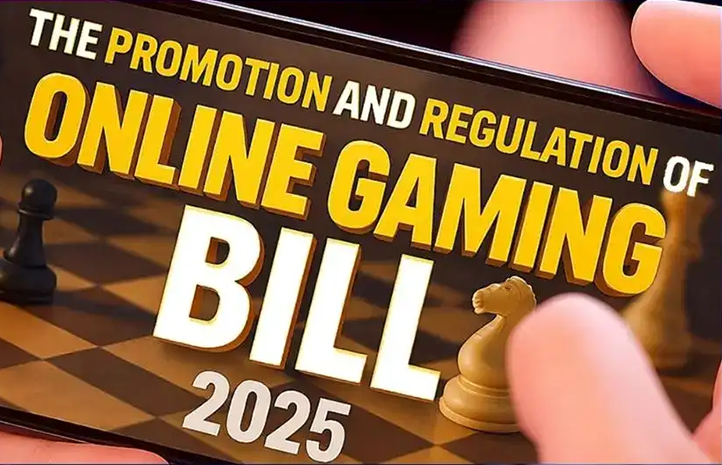The Indian online gaming industry has expanded tremendously in recent years,
contributing to the digital economy. The industry is valued at $3.7 billion in 2025 and is
expected to more than double to $9.1 billion by 2029. However, this growth is heavily
skewed as approximately 86% of revenues generated from this sector today comes from
real money games (RMGs), where users stake money in hopes of monetary returns.
This disproportionate dependence on money gaming has also given rise to growing
concerns. Consistently, voices have been raised on the need for a comprehensive law
to prevent harms emanating from such gaming platforms including rising cases
of addiction among youth, financial distress in families, manipulative algorithms,
aggressive advertising campaigns, tax evasion and even links to money
laundering and terror financing. Responding to these concerns, the government has
introduced the Promotion and Regulation of Online Gaming Act, 2025 in the
parliament.
The Act stems from the twin realities of India’s online gaming landscape. On the one
hand, India’s gaming industry includes e-sports, online social gaming and educational
games that offer opportunities for employment, innovation and global
competitiveness. On the other hand, real money gaming platforms have raised
alarms due to their addictive nature, manipulative algorithms, celebrity-driven
marketing and association with fraud, money laundering and as a threat to
national security as its proceeds may be used for terror financing.
As of June 2025, the Central Government had already issued over 1,500 blocking orders
against online betting and gambling platforms. In addition, since October 2023, a flat
28% GST has been imposed on revenues from online gaming in an attempt to curb the
rapid spread of such platforms by tightening the fiscal net. However, enforcement
challenges persist particularly with offshore operators that evade domestic
regulations. Meanwhile, several states have reported socially distressing consequences
linked to these platforms, ranging from addiction among youth and financial distress in
families to rising cases of fraud and public health concerns. It is against this backdrop
that the Act has been introduced, seeking to provide a uniform national framework:
one that encourages innovation and growth in safe areas such as e-sports, while decisively
prohibiting the harmful aspects of online money gaming
The Act further proposed that the Central Government will establish an Authority on
Online Gaming which will oversee and regulate the online gaming space. This body
shall have the authority to register and recognise online games, decide whether a
particular game qualifies as money gaming and handle user complaints while ensuring
compliance with prohibitions put on online money gaming.
E-sports are recognised as legitimate sports, involving skill, competition and
strategy. While participation fee is allowed in this category. Games involving any
form of betting are excluded from this category.
Online Social Game: These are games which fall in neither online money games
nor esports category and may be offered solely for entertainment, recreation or
skill-development purposes. These may charge subscription or one-time access
fees, but must not include staking money or played with expectation of monetary
rewards.
Online Money Games: This is broadly defined to include any game either
skill-based or chance-based, wherein players stake money or equivalents expecting
to win monetary returns.
This distinction serves the basis of prohibiting all forms of online money games due to
their harmful effects, while simultaneously encouraging innovation and growth in
e-sports and safe gaming formats.
While the Act imposes a blanket ban on online money gaming platforms it encourages
the development of esports. Provisions in the Act obligate the Central Government
to actively promote e-sports by framing guidelines and standards for
tournaments, establishing training academies and research centres, running
incentive schemes, awareness campaigns and public outreach programmes, while
also coordinating with States and sporting federations to integrate e-sports into
mainstream sports policy.
Similar encouragement is given to social and educational games with proposals to set up a
registration mechanism for such games, support developers and platforms offering safe,
age-appropriate content, conduct awareness programmes to highlight the role of games
in recreation, skill development and digital literacy and collaborate with schools,
universities and recreational bodies to expand digital engagement through safe gaming.
The Act further proposed that the Central Government will establish an Authority on
Online Gaming which will oversee and regulate the online gaming space. This body
shall have the authority to register and recognise online games, decide whether a
particular game qualifies as money gaming and handle user complaints while ensuring
compliance with prohibitions put on online money gaming.
wThe Act prohibits offering or facilitation of online money games, advertisements,
promotions, or endorsements of such platforms and even on the processing of financial
transactions for online money games. The violation of these prohibitions will attract
financial and criminal penalties.
The Act prescribes stringent penalties on violation of the prohibitions prescribed in the
Act. Punishments up to 3 years’ imprisonment or ₹1 crore fine or both for offering
online money gaming services, up to 2 years’ imprisonment or ₹50 lakh fine or both for
advertising money gaming, up to 3 years’ imprisonment or ₹1 crore fine or both for
financial facilitation of money gaming. Furthermore, repeat offences carry harsher
punishment of up to 5 years in prison and ₹2 crore fines.
It is to be noted that the Act declares offences for offering online money gaming services
or facilitating financial transactions or authorisation towards online money gaming
services to be cognizable and non-bailable.
This is India’s first comprehensive central legislation on online gaming, resolving
long-standing inconsistencies in state-level rules. It explicitly settles the debate of skill vs
chance, banning all formats of money gaming, regardless of whether they are skill-based
or chance-based. The Act encourages safe formats such as e-sports and social games
while prohibiting harmful money gaming practices, through this it attempts to strike a
balance by supporting India’s ambition to be a global gaming hub while protecting
citizens from the risks of unregulated money games.


